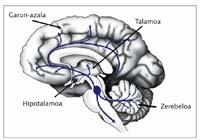More efficient and faster antidepressants

The pharmacological and biochemical Jorge Emilio Ortega Calvo proposes a new strategy that improves the deficiencies of current antidepressants in his doctoral thesis presented at the University of the Basque Country.
Noradrenaline and serotonin are the two neurotransmitters that most affect depression. In depression, noradrenaline and serotonin levels are altered. Therefore, the work of antidepressants is to balance the levels of noradrenaline and serotonin. However, one of the main problems facing curative treatments for this disease is that only 60-70% of patients respond to treatment. Also, the effect of antidepressants can be seen in about two or four weeks, which in some cases is too long. In fact, many patients abandon treatment because they do not experience improvement in the very short term.
In this sense, the main objective of this doctoral thesis has been to investigate the mechanisms of action of antidepressant drugs, in order to identify treatments that involve improvements from the beginning, as well as an adequate treatment for those patients who do not respond to these treatments.
To do this, the treatments used so far have been combined with new goals, such as the antagonistic drugs of adrenoceptors <unk> 2, which help strengthen and increase brain neurotransmission. In fact, several studies have revealed that the adrenoceptors in the postmortem brains of patients who were diagnosed with depression and committed suicide are altered, that is, their function is increased, leading to a greater braking than normal. This brake prevents the proper functioning of neurotransmitters.

All this research has been carried out in animals using the technique of cerebral microdialysis, that is, by surgery several probes have been inserted in different areas of the brain and the neurotransmitters of these areas have been collected and measured to observe how they change after the application of the drugs.
The results show that the proposed new strategy is capable of increasing the number of people responding to treatment and shortening the time between the start of treatment and the therapeutic response. Therefore, by moving all this to clinical trials and starting to apply to patients with depression, responses may be faster than current antidepressants and get more patients treated.





